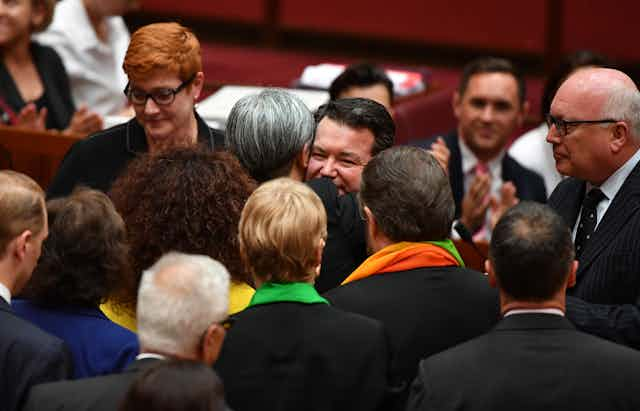The same-sex marriage bill has passed the Senate, after all the amendments to insert protections and restrictions were voted down.
The bill was carried 43-12, which was followed by strong applause and cheers from onlookers in the public gallery.
Those voting against were Liberals Eric Abetz, Concetta Fierravanti-Wells and Slade Brockman, Nationals Matt Canavan, John Williams and Barry O'Sullivan, Labor’s Helen Polley and Chris Ketter, Australian Conservatives’ Cory Bernardi, One Nation’s Brian Burston, and independents Fraser Anning and Lucy Gichuhi.
The legislation has to wait until next week to go to the House of Representatives, because the government called off that house’s sitting this week.
The defeat of the raft of amendments has angered some of the already-frustrated backbench conservatives, adding to the pressure on Malcolm Turnbull, although the impending passage of the legislation represents a win for the prime minister.
The only changes to the historic private senator’s bill, put forward by Liberal campaigner for same-sex marriage Dean Smith and cross-party sponsors, were a small block of technical amendments. They were passed without division.
The amendments moved by Liberal conservatives and defeated on Tuesday and Wednesday included:
having two definitions of marriage in the legislation;
giving parents the right to withdraw children from classes that had teaching on marriage they disagreed with; and
specifying that a person or organisation could not be subjected to any detriment by a public authority because they held a traditional view of marriage.
Several moderate Coalition senators voted against those amendments.
Amendments moved by Attorney-General George Brandis would have included a declaratory statement about freedom of religion in the bill, and allowed civil celebrants to refuse to perform same-sex marriages on the basis of their religious or conscientious beliefs.
To take some of the heat out of the debate about religious protections, Turnbull last week announced a “stocktake” of Australia’s religious freedoms and protections. It will report early next year.
Nationals backbencher Andrew Broad, speaking before the Senate vote, attacked Turnbull for a “complete lack of leadership” on the issue.
“All assurances both by the prime minister and the opposition leader that religious freedoms would be protected – that they believed in those – seemed to be walked away from in what I think is a rather sneaky way,” Broad told the ABC.
The marriage legislation was given priority this week, with Turnbull saying the remaining sitting days for the year should be devoted to legislating the “yes” result of the postal vote and dealing with the citizenship crisis.
A highlight of the three-day debate on the marriage bill was a speech from Brandis.
He told the Senate on Tuesday: “Profoundly important though the acceptance of same-sex marriage may be as a social change, its symbolic significance is even greater still.
"With the passage of this bill, we will demolish the last significant bastion of legal discrimination against people on the grounds of their sexuality. At last, Australia will no longer be insulting gay people by saying: different rules apply to you.”
While Labor MPs had a free vote on the bill, the opposition imposed party disciple to have its senators vote against all amendments.
Canavan, saying he could not support the bill because the moves for protections had been defeated, claimed a “political fix” between the Labor Party, some Coalition senators and the Greens had been in before the amendments had been debated.
Abetz said he hoped the House of Representatives would look at seeking to “ameliorate and alleviate” the concerns of the nearly 5 million Australians who voted no.
Victorian Liberal James Paterson, a leader of the charge for amendments, said despite their failure he would vote for the bill. “Today is a day for celebration and my heart goes out to all of the gay couples who have been waiting for too long to get married. I look forward to seeing your joy at being able to finally do so.”
Fierravanti-Wells, pointing to the “no” vote in western Sydney areas, said: “This will be a very, very difficult day for many people who are of different religions”. It was important to show respect across the divide, she said.
Pauline Hanson said she would be abstaining. She said she was torn – she agreed with the marriage of same-sex couples but she did not agree with the impact the legislation would have in its unamended form.
Labor’s Senate leader Penny Wong, a strong advocate for changing the marriage law, said: “This day would not have come without the courage and dedication of all who have campaigned, and it would not have come without the decision of the Australian people to vote yes.
"In that vote, the grace and decency of our countrymen and women shone through. And in voting yes they pushed our parliament to do what should be done. We may be their representatives, but in this, they have been our leaders.”
Smith told how reflecting on the death of Lindt cafe siege victim Tori Johnson, a gay man who left behind his partner, had been seminal in changing him to a supporter of same-sex marriage. He said: “This has been a very long path. Some have put this case for a decade-and-a-half, others, like myself, are latecomers”.
Appealing for tolerance towards those with a different view, Smith said: “Over the past few years, there have been times when it has been tough to not be part of the majority of my party on this issue. I had to find my place where my conscience and my duty could be reconciled.
"So, I say to all in this chamber, be kind to those who, in following their conscience, choose a different path. They have my respect and I ask you to give them yours.”

